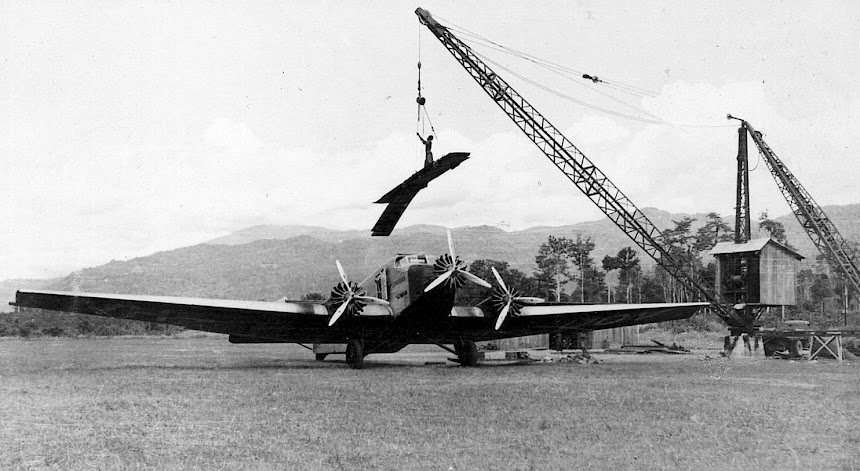 |
| Michael Waterhouse showing a copy of his book at the Crowne Plaza in Port Moresby today.-Nationalpic by MALUM NALU |
By MALUM NALU
A spectacular new history book on the history of the famous Wau/Bulolo goldfields of Morobe province was launched at the Crowne Plaza in Port Moresby last Friday.
Guests included Bulolo MP Sam Basil, mining and business leaders and many more.
Not A Poor Man’s Field, by Australian Michael Waterhouse, explores Australia’s colonial experience in New Guinea before World War 11 – a unique but little-known period in the history of both countries.
Waterhouse has close family ties to the pre-war goldfields, his grandfather Leslie Waterhouse having been a pivotal player in their development, as a director of the largest gold-mining company, Bulolo Gold Dredging, and the biggest airline, Guinea Airways.
First copies are on sale at the University of PNG Bookshop.
Waterhouse and his wife came to Port Moresby on Oct 4, overnight, and then traveled on to the fabled Morobe gold towns of Lae, Wau, Bulolo and Salamaua before returning to Port Moresby for the book launch.
He tells The National that Not A Poor Man’s Field is not simply another “white man’s history”.
“For the record,” Waterhouse says, “while the sub-title refers to it being an ‘Australian colonial history’, this is because the main market is in Australia and the book has to be positioned as ‘Australian history’ to be commercially-viable.
“However, I’ve gone to considerable lengths to bring a New Guineans perspective to the history.
“This is not simply another ‘white man’s history’.
“I do feel strongly about this – it is your country’s history as well, and I’ll make this point at every opportunity.”
Not A Poor Man’s Field is a dramatic account of small miners, an extraordinarily-rich gold discovery, visionaries and the construction of giant dredges, power stations and townships in a remote jungle area
It is also the story of how risk-taking pilots, flying aeroplanes ranging from single-engine plywood biplanes to large Junkers G31 freighters, opened up an otherwise-impenetrable country.
New Guinea led the world in commercial aviation throughout the 1930s; world records were often set and as often broken.
The book discusses early encounters between villagers and Europeans from both white and black perspectives, as well as the indentured labour system which drew New Guineans to the goldfields from all over the country.
Other themes include the camaraderie of white settlers in an alien environment, race relations in a colonial society, the ineffectiveness of Australia’s administration of New Guinea under a League of Nations mandate and the Japanese invasion and its consequences.
The book takes a multi-disciplinary approach, analysing the colonial experience from economic, social, ethnographic and political/administrative perspectives.
Not A Poor Man’s Field takes its name from the Administrator of New Guinea, Brigadier General Evan Wisdom, who when trying to discourage Australians rushing to the goldfields in 1926, wrote: “A poor man’s field in Australia is understood to be a field to which a man without anything can go with his swag and live by the gold he gets from the field; he is not dependent on anyone helping him.
“He can go out with a swag and a tin of ‘dog’ and get enough gold to keep him going.
“But you must have natives here to help you, and money to pay them, money to carry you there, and on when you get there; therefore it is not a poor man’s field.”
Waterhouse hopes his book will encourage academics in both countries to embark on further research into, and help develop a broader understanding of the history of the Australia-PNG relationship.
Waterhouse has recreated a period that has been largely obscured by time and the destruction of records during WW11.
In doing so, he has drawn on diverse and often unexpected source, with insights gained from studies in anthropology at Sydney University and in economics and economic history at the Australian National University.
His experience in senior positions with government (the Commonwealth Treasury) and in business (with Westpac and as a consultant) has also enabled him to explore the commercial, financial and government dimensions in depth.

My grandfather was the dredge superintendent that arrived in Bulolo from the USA with the first dredge and assisted in erecting it and was later the dredge master for dredge number 5. Prior to his death he wrote his memoirs and in it he documented the quantity of gold being taken. I would be happy to pass this on to you for your research. My grate grandfather was CLB Wilde who was one of the pioneers in the area funding many of the first prospectors.
ReplyDelete